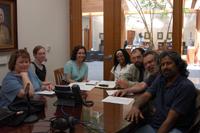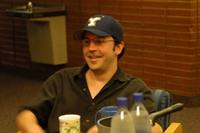

WESTCHESTER COUNTY, NY - How did you spend your summer? Many Americans spend summers barbecuing, enjoying outdoor sports, visiting new places and learning new skills. A select group of 15 participants in the intensive, three-week 2005 Field School for Cultural Documentation accomplished all that, documented other people pursuing those pastimes, and more!
Much more, in fact. Not only did they learn new skills, they applied them to conduct the ethnographic initiative, "Tradition Runs Through It: Environment and Recreation in Provo Canyon." This archive of tape-recorded interviews, photographs, fieldnotes and material culture (i.e., physical artifacts); associated exhibit at BYU's L. Tom Perry Special Collections; and presentations at the exhibit opening/reception on August 5 comprise the initial foundation for the Utah Heritage Project. Field School Co-Directors Kristi Young - Curator of the Wilson Folklore Archives at Brigham Young University, and David Taylor - Folklife Specialist at the Library of Congress American Folklife Center, said the 2005 Field School cohort did the best work they'd ever seen in the decade Field School has been offered! Not a bad for a bunch of greenhorns.
Broadcast synopsis:
In today's follow-up to the July 27 Lisa Tolliver Show broadcast (which prominently featured cultural experts discussing folk life in general and how to preserve it), Young (far left in the photo on the left) and two of Tolliver's Field School classmates, Lisa Powell from Kentucky (second from the left in photo on the left), Steve Taylor from Pennsylvania (photo on the right) , and discussed their summer "vacation alternative" from the trainees' perspective. In contrast, the July 27 show more prominently featured descriptions of folklore in general and how to document it by Field School Co-Directors Young and David Taylor - Folklife Specialist at the Library of Congress American Folklife Center (AFC), Taylor's AFC colleagues Ilana Harlow and Guha Shankar, and documentary photographer Rich Remsberg.
Who participated in Field School 2005?
Alumni are adults from throughout the USA and various professions, who were interested in learning cultural documentation but lacked substantial prior experience. Successful applicants shared their rationale for attending Field School and plans for conducting future ethnographic projects.
What did they learn?
As the Field School website states:
The American Folklife Center, a leader in ethnographic field research for close to three decades, has developed a model for an intensive, three-week-long field school for cultural documentation, and then putting it into action through partnerships with educational institutions across the country. The Center’s field school, which was first held in 1995, offered hands-on training, for beginners, in such areas as research ethics, considerations for preliminary research, interviewing techniques, sound-recording techniques, documentary-photography techniques, ethnographic-observation techniques, fieldnote-writing techniques, the archival organization of multi-format ethnographic collections, and the development of public products and programs based on documentary material gathered in the field. The training, which is provided by members of the Center’s professional staff along with other experienced cultural specialists, includes lectures, hands-on workshops, discussions, and supervised team-based fieldwork with a carefully selected cultural community.
What did they document, exactly?
Field School participants organized into three-person teams to document five specific aspects of Provo Canyon's culture and environment. These included: fly fishing (Powell's team); Mormon dating practices (Taylor's team); the changing faces of Provo Canyon's environment, recreation and people (Tolliver's team); long-term Canyon communities Springdell and Wildwood; and long-standing local families, such as the Stewarts (who once owned substantial acreage in Provo Canyon, christened many landmarks with the family moniker, and continue to wield substantial influence locally).
To learn more:
To learn more about "Tradition Runs Through It," click here. To learn about applying to Library of Congress-sponsored Field Schools for Cultural Documentation, click here. To get ideas and assistance to conduct folklore projects click here.
Next broadcast:
Lisa Tolliver ShowAugust 24 at 1:30-2:00 pm, Eastern Time
New York Radio WVOX AM 1460 or www.wvox.com
Call-in line: (01) 914 636 0110
###





